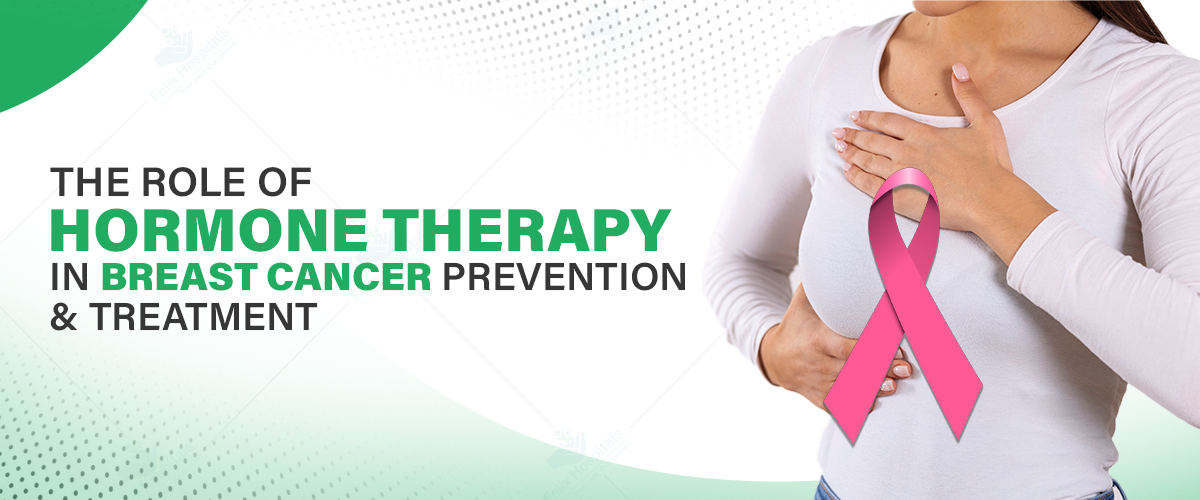
Subscribe to our

Breast cancer is one of the most prevalent cancers among women globally. Hormone therapy has become an essential tool in both preventing and treating hormone receptor-positive breast cancer. This type of cancer is particularly driven by hormones like estrogen and progesterone. Hormone therapy works by either lowering hormone levels or blocking their effects, which helps slow down or stop the growth of cancer cells.
The best cancer hospital in Noida includes hormone therapy as a component of its holistic treatment plan. With increasing research, newer techniques are being developed to improve efficacy and minimize side effects. Below, we explore hormone therapy's role in breast cancer prevention, its applications in treatment, and the benefits, risks, and future advancements associated with it.
Hormone therapy can be a game-changer in breast cancer treatment and prevention. Contact us for detailed information by Calling +91 9667064100.
Hormone therapy (endocrine therapy) is a treatment designed to alter or block hormones that fuel the growth of certain cancers, especially breast cancer. This therapy primarily targets cancers that are estrogen and progesterone-receptor-positive.
For women at high risk of developing breast cancer, hormone therapy is also used as a preventive measure. Women with a family history of breast cancer, those carrying genetic mutations such as BRCA1 or BRCA2, or those with benign breast conditions, may benefit from hormone therapy.
1. Preventive Medications:
Hormone therapy is most commonly used to treat hormone receptor-positive breast cancer, which accounts for 70-80% of all breast cancers.
1. Key Medications:
2. Post-Treatment Use: Hormone therapy for breast cancer is often used after surgery, chemotherapy, or radiation to reduce the risk of recurrence. Treatment duration typically lasts between 5 to 10 years, depending on the individual’s health and response to therapy.
Hormone therapy for breast cancer has proven benefits, particularly in reducing recurrence and improving survival rates for patients with hormone receptor-positive breast cancer.
Although Hormone therapy for breast cancer is effective, it does come with a range of potential side effects and risks.
1. Common Side Effects:
2. Long-Term Risks:
Hormone therapy is most effective for patients with hormone receptor-positive breast cancer. A healthcare provider will evaluate several factors to determine if hormone therapy is appropriate.
1. Factors for Eligibility:
Advancements in Hormone therapy for breast cancer are focusing on personalization and precision in treatment. Researchers are exploring newer drugs that target hormone receptors more specifically, reducing side effects and improving efficacy.
At Felix Hospitals, we are committed to providing the highest standard of care for breast cancer patients, especially those requiring hormone therapy. Our team of expert oncologists, including Dr. Mukta Baxi and Dr. Vinita Kumari, specialize in hormone receptor-positive breast cancer treatment. With years of experience in the field, Dr. Baxi and Dr. Shriwastava offer personalized treatment plans tailored to each patient’s unique needs. Dr. Baxi is renowned for her expertise in medical oncology and is dedicated to using the latest advancements in hormone therapy to improve outcomes for her patients.
Are you at risk for breast cancer or have you been diagnosed with hormone receptor-positive breast cancer? Schedule a consultation with our experts in Noida.
Hormone therapy remains an essential part of both breast cancer prevention and treatment. By lowering estrogen levels or blocking estrogen receptors, Hormone therapy for breast cancer reduces the risk of cancer recurrence and improves long-term survival rates. While there are side effects and risks, these can be managed with proper medical supervision. As research continues, more personalized and effective hormone therapies will further enhance outcomes for patients.
Women at high risk or those diagnosed with hormone receptor-positive breast cancer should consult with an oncologist to determine the best treatment plan tailored to their individual needs.
1. What are the main types of hormone therapy used for breast cancer treatment?
Ans: The primary types of hormone therapy for breast cancer treatment include Tamoxifen (a selective estrogen receptor modulator or SERM), aromatase inhibitors like Letrozole and Anastrozole, and ovarian suppression methods.
2. How does hormone therapy prevent breast cancer in high-risk women?
Ans: Hormone therapy works by reducing estrogen levels or blocking estrogen receptors, which can help prevent the growth of hormone receptor-positive breast cancer in women at high risk due to genetic factors, family history, or other conditions.
3. What are the long-term effects of taking Tamoxifen?
Ans: While Tamoxifen is highly effective, long-term use may increase the risk of uterine cancer, blood clots, and endometrial changes. It’s essential to have regular check-ups and screenings during and after treatment.
4. Is hormone therapy effective for all types of breast cancer?
Ans: Hormone therapy is most effective for hormone receptor-positive breast cancers. It may not be suitable for hormone receptor-negative cancers, which do not respond to hormonal treatments.
5. What should I expect during hormone therapy for breast cancer?
Ans: During treatment, you may experience side effects such as hot flashes, fatigue, and mood swings. Your doctor will monitor your health closely and may adjust the treatment plan to manage these symptoms effectively.
6. Can hormone therapy be combined with other cancer treatments?
Ans: Yes, hormone therapy is often used alongside surgery, chemotherapy, or radiation therapy to lower the chances of cancer recurrence and improve overall survival rates.
7. How long does hormone therapy typically last for breast cancer treatment?
Ans: Hormone therapy typically lasts for 5 to 10 years after surgery or other treatments. The exact duration depends on the individual’s health, response to therapy, and cancer type.
8. Can hormone therapy reduce the risk of breast cancer recurrence in premenopausal women?
Ans: Yes, premenopausal women may benefit from hormone therapy, particularly through ovarian suppression combined with medications like Tamoxifen or aromatase inhibitors. This approach helps lower estrogen production and reduces the likelihood of cancer recurrence.